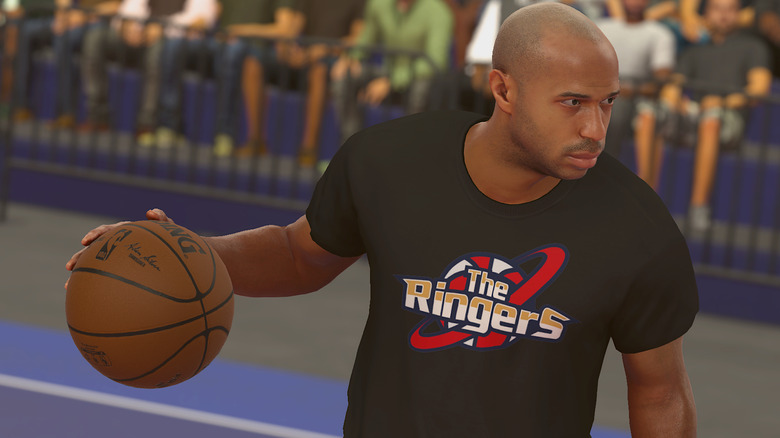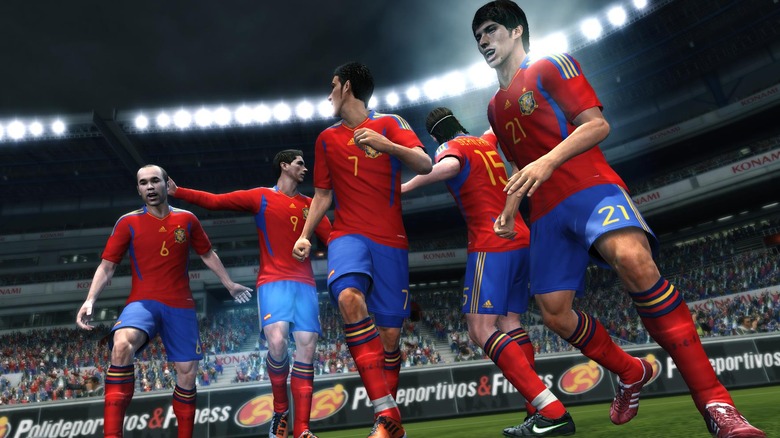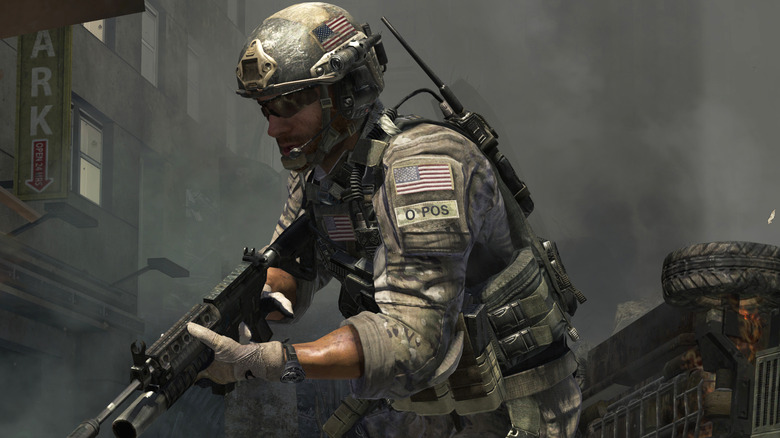Video Games That Sent People To The Hospital
Let's face it: modern life comes with its mishaps. That's why video game enthusiasts take to virtual worlds, where fantastic forests are splinter-free and biffing it on the double diamond doesn't mean staying off the slopes for six months. Unfortunately, that doesn't mean your favorite joystick-jiggling pastime is always so painless. In fact, video games offer tons of unique ways to get bruised, battered, and busted up. Let's strap on our bike helmets, wrap our tennis elbows, and check out some of the most infamous moments of video game-induced trips to the hospital.
Party pains
Nintendo's virtual board game, Mario Party, is all about friendly rivalries and lighthearted competition — at first. Then, it's about racing to the freezer to stick your hands in the ice cube tray once the "Nintendonitis" sets in. Gamers who grew up in the late '90s might recall a peculiar epidemic sweeping the nation: Nintendo thumb. This actual medical condition — otherwise known as RSI, or "repetitive-stress injury" — was categorized by intense and prolonged joystick usage, and it resulted in potential blistering, numbness, swelling, and even burning of gamers' thumbs.
While a similar phenomenon gripped Atari gamers' digits back in the late '70s and early '80s, it seemed as though the Nintendo 64's controller was all but designed to get youngins' thumbs throbbing. In order to quell raging parents who had a whole new reason to demonize video games, Nintendo eventually decided to provide special protective gloves to any gamers fearing a fatal finger fumble.
Despite its role in bringing video game-related health problems to parents' attention — no thanks to some only slightly hyperbolic new stories — Mario Party wasn't the first instance of joystick-induced injury. And it wouldn't be the last. Because gaming... Gaming never changes.
The one with the super mutants
Who knew Friends' Chandler Bing was such a hardcore gamer? Apparently, iconic actor Matthew Perry is a big fan of the Fallout series. How do we know? Well, he's got the battle scars — and needle punctures — to prove it. During an April 2009 interview on The View, Perry came clean about his obsession with the post-apocalyptic RPG, telling the hosts that he "played Fallout 3 so often that [he] had to go to a hand doctor," and adding that he needed to get "injections in [his] hand" to alleviate the pain. Sounds like he could've used a stimpak, but whatever his doc gave him probably worked wonders.
That's not where this odd tale ends, though. Appearing on The Ellen DeGeneres Show that same month, Perry told a similar story (featured in the clip above). But this time, the star brought more than just a cautionary tale — he also donated a signed Xbox 360 and a copy of his favorite game to DeGeneres' eBay-driven charity initiative. Sure, DeGeneres might've joked about Fallout fans being devil worshippers, but it looks like this act of kindness bolstered Perry's karma.
Engadget reported that publisher Bethesda and developer Obsidian took notice of the actor's compassion — and his ultra-fandom — and so they tapped him to voice the weasley Chairman bigwig Benny in 2010's Fallout: New Vegas. Now that's a happy ending.
Tech-knuckle foul
Serious basketball players had better keep their paws in topnotch condition. After all, their careers ride on their ability to pass, shoot, dribble, and dunk. So it likely came as a bit of a surprise to both his fans and fellow athletes when Joel Berry II, a point guard for the North Carolina Tar Heels, started off the 2017 season with a protective brace around his hand. If you're thinking he sustained an injury during practice or at the gym, you'd be wrong.
The Herald Sun has the full story: After losing a heated multiplayer match of NBA 2K18 to his friend/roommate/bitter rival Theo Pinson, Berry did what any gamer worth his salt would do — he took his rage out on an inanimate object. Specifically, he punched his door, catching one of his fingers on the frame and breaking a bone in his hand. But Berry took his stint with sore loserdom as a learning experience, joking that, "The door was doing just fine for the last three weeks ... " while his damaged digit kept him off of the court. Door 1, Berry 0. We eagerly await the rematch.
Guitar Hero hang-ups
The hard-partying lifestyles of music's rowdiest rockstars are brimming with bumps and bloodshed. Likewise, the same can be said for the demanding regimens of professional baseball players — but that doesn't mean the two have much else in common.
And yet, let's examine the tale of Joel "Zoom-Zoom" Zumaya, former pitcher for the Detroit Tigers. Known for launching fastballs at over 100 MPH, Zumaya had a history of injuries wrought by reckless behavior. His most infamous injury, however, had nothing to do with baseball — and everything to do with Activision's wildly popular rock god sim Guitar Hero.
Back in 2006, Zumaya was mysteriously sidelined for the first three games in the American League Championship Series. Engadget reported that Detroit Tigers president Dave Dombrowski eventually disclosed the reason for the pitcher's bad arm. Zumaya had injured his wrist playing the Guitar Hero on the PlayStation 2, and his arm had become inflamed as a result. Eventually, Zumaya gave up the game and returned to the pitcher's mound for a few more years — until he suddenly tore an ulnar collateral ligament and left America's pastime behind for good.
No word yet on whether or not a plastic guitar was involved in his career-ending injury.
Blunderhand
In case you haven't noticed by now, professional sports and video games don't mix — at least, not for players so competitive they'll put their limbs in harm's way to win. Following in the time-honored tradition of athletes sustaining injuries from small controllers is Andy Murray, a Grand Slam-winning tennis player who sprained his tendon playing Pro Evolution Soccer 2011.
According to Daily Express, Murray began to feel a twinge in his hand during a cut-throat match against his doubles player, Dani Vallverdu. As one does, Murray soon took to Twitter to announce his injury, tweeting, "... hahaa I just lost 1 match to dani at the new pro evolution and I think I broke my hand!"
Now, we can understand why Joel Berry II's door frame beatdown sent him to the hospital — and we can even believe that "Zoom-Zoom" Zumaya's nonstop Guitar Heroism might've kept the pitcher off the mound. But there's something suspicious about the idea of an Olympian like Murray busting his money-makers playing a game that, at its most strenuous, involves aggressive button-mashing and analogue stick swiveling. Unless, of course, the two athletes were playing on Nintendo's patented sports injury simulator — the Wii.
Wii can't move our arms
Nintendo's Wii console revolutionized interactive home entertainment, introducing a casual — even athletic — video game experience to players both young and old. It also ushered in a whole slew of new gaming-related injuries collectively titled "Wii-itis." Sure, the name is nowhere near as catchy as "Nintendonitis," but the symptoms of this injury-sequel are just as painful. In 2007, Reuters reported the story of Dr. Julio Bonis, a family physician who first described the condition in a letter to the New England Journal of Medicine.
Bonis compared a collection of symptoms he began to suffer after long hours playing Wii Sports to those of tennis elbow, which, according to the Mayo Clinic, is categorized by pain and difficulty gripping objects which results from overloaded tendons. The doctor treated himself with ibuprofen and "complete abstinence from playing Wii video games." And while that likely worked to alleviate the soreness in his elbow, it doesn't exactly sound like a solution for gamers who've suffered other, less common Wii-related injuries like falls, dislocations, and head injuries resulting from flying Wii Remotes.
Fall of Duty
If video game mishaps can bench buff, badass ballers and ball-players, chances are they can do a number on you — especially if you're a 15-year-old kid with a penchant for neglecting to hydrate in between deathmatches. But a certain young Call of Duty fan must have missed that memo. In August 2010, Ohio teen Tyler Rigsby sat down to play Call of Duty: Modern Warfare 3 for four days straight, taking breaks to hit up the kitchen for snacks and showering intermittently.
Rigsby's aunt told NBC4 that, on the fourth or fifth day of his gaming bender, she and Rigsby's mother heard a sudden "thump." Tyler had collapsed on the floor, unresponsive, skin pale and lips blue (via the Daily Mail). Apparently, Rigsby had suffered from severe dehydration, which caused his blood volume and blood pressure to drop to dangerously low levels, restricting the oxygen to his brain and causing him to pass out. Fortunately for the wounded young warrior, paramedics were able to quickly treat him, attaching an IV drip to his arm and returning his blood volume to normal levels.
We're glad Rigsby's doing better, and we can't help but feel for the guy. Following his stint at Columbus, Ohio's Nationwide Children's Hospital, his mother promptly pulled the plug on his favorite hobby — for the time being, at least. "The Xbox is gone," she said, adding, "this was a close call."
Blinded by the light
Mobile devices might offer small-screen gaming experiences, but they can result in big-time injuries for obsessed players. In October 2017, Channel NewsAsia reported that a 21-year-old woman lost partial sight in her right eye after marathoning infamous mobile game and so-called virtual "poison" Honour of Kings.
While casual players likely don't have to worry about going blind from playing a video game, the anonymous Guangdong finance worker was among the game's most hardcore fanatics. In fact, she spent almost all of her free time duking it out in arena-style battles, devoting entire days off to the League of Legends-like app. It was exactly this dedication that led to her experiencing extreme eye strain which, in turn, caused her to develop retinal artery occlusion, a phenomenon commonly referred to as an "eye stroke."
Doctors attempted to repair the damage she'd done to her vision, though there's no word on whether or not they succeeded. Either way, one thing's for sure: When it comes to gaming, moderation is key — even for the toughest, most hardcore gamers.
Brokémon
Ever since it burst onto the Nintendo Game Boy in the mid-90s, Pokémon has captured the hearts of both kids and adults, putting them in the sneakers of Pocket Monster trainers on a quest to be "the very best, like no one ever was." So when Niantic released the long-awaited Pokémon Go, an augmented reality game that let players catch 3D Pokémon on their smartphones, fans went wild — and understandably so. For the first time in gaming history, each player was the protagonist of his or her own journey. And for the first time in gaming history, the scrapes, bumps, and bruises weren't digital — they were real.
From Pokéholics sustaining fractures and broken bones to distracted drivers slowing down for Digletts instead of yield signs, the injuries caused by — or, at least, blamed on — Pokémon Go were innumerable.
Any Pokémon fan worth their weight in rare candy knows the dangers awaiting TV series hero Ash Ketchum at every turn. And while Team Rocket, ghost Pokémon, and gym battles can pose cartoonish threats, no real-world trainers expected to find their way to the ER courtesy of ditches, traffic, or the scorching sun.





